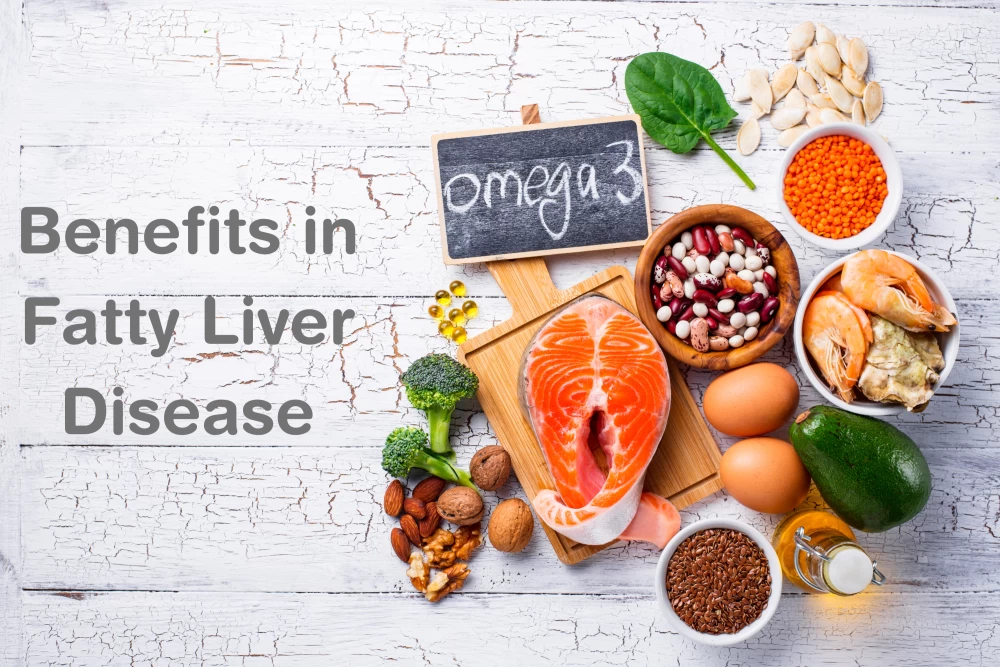
- 25th March 2023
Table of Contents
Fatty Liver Disease
Omega-3 fatty acids have been found to be beneficial in the treatment of non-alcoholic fatty liver disease (NAFLD). These essential fatty acids help to reduce inflammation in the liver and improve its function. Studies have shown that omega-3 supplementation can decrease liver fat content, improve insulin sensitivity, and reduce inflammation markers. One study found that taking omega-3 supplements for six months resulted in a significant reduction in liver fat content by up to 50% in patients with NAFLD. Another study showed that supplementing with omega-3s improved insulin sensitivity and reduced inflammatory markers associated with fatty liver disease. Omega-3s can also be obtained through dietary sources such as fish, nuts, and seeds. Overall, incorporating omega-3 fatty acids into your diet or considering supplementation may be a helpful addition to your treatment plan for fatty liver disease. However, it is important to consult with your healthcare provider before making any changes to your diet or supplement regimen.
What Are Omega-3s?
Omega-3s are a type of essential fatty acid that our bodies cannot produce on their own. They must be obtained through our diet, usually from fatty fish like salmon, mackerel, and sardines. Omega-3s have been shown to have many health benefits, including reducing inflammation and improving heart health. One specific benefit of omega-3s is their ability to improve fatty liver disease. Fatty liver disease occurs when there is an accumulation of fat in the liver, often due to poor diet and lifestyle choices. Studies have found that consuming omega-3s can help reduce the amount of fat in the liver and improve overall liver function. It is important to note that while omega-3 supplements are widely available, it is best to obtain them through a healthy diet rich in fatty fish and other sources like flaxseeds and walnuts. As with any dietary change or supplement addition, it is always best to consult with a healthcare professional before making any changes.
Omega-3s and FLD
Fatty liver disease (FLD) is a condition that affects many individuals worldwide. It occurs when fat accumulates in the liver, leading to inflammation and sometimes scarring. One of the primary causes of FLD is an unhealthy diet, which includes high levels of saturated fat and sugar. Fortunately, studies have shown that omega-3 fatty acids can help to prevent or reduce the severity of FLD. Omega-3s are a type of polyunsaturated fatty acid that our bodies cannot produce naturally. They are essential for maintaining healthy brain function, reducing inflammation, and promoting heart health. Research has found that omega-3s have anti-inflammatory properties that can help to reduce inflammation in the liver caused by excess fat accumulation. In one study, participants with non-alcoholic FLD who consumed omega-3 supplements for six months saw significant improvements in their liver function tests compared to those who did not take supplements. Other studies have also linked higher omega-3 intake with reduced risk of developing FLD in the first place. Incorporating more foods rich in omega-3s such as fatty fish, nuts, and seeds into your diet may be an effective way to improve liver health and prevent or manage FLD.

Potential Benefits of Omega-3s
Fatty liver disease is a common condition that affects millions of people worldwide. Research has shown that omega-3 fatty acids can potentially help improve this condition by reducing inflammation, promoting fat metabolism in the liver, and decreasing oxidative stress. Omega-3s have been found to reduce liver enzyme levels which are often elevated in those with fatty liver disease. In addition, omega-3s may also help prevent or slow the development of non-alcoholic fatty liver disease (NAFLD) by reducing insulin resistance and improving glucose tolerance. These benefits may also extend to those with other metabolic disorders such as diabetes and obesity, which are closely related to NAFLD. Consuming foods high in omega-3s such as fatty fish like salmon or taking a supplement may be beneficial for individuals looking to improve their overall liver health. However, it's important to consult with a healthcare professional before making any changes to your diet or supplement regimen.
Recommended Intake
Omega-3 fatty acids have been identified as a potential treatment for non-alcoholic fatty liver disease (NAFLD). The recommended daily intake of omega-3s for adults is 250-500 mg. This can be achieved through consuming oily fish, such as salmon or tuna, or taking supplements. For those with NAFLD, a higher intake may be necessary. Studies have shown that up to 4 grams of omega-3s per day can improve liver function and reduce inflammation in the liver. However, it’s important to speak with a healthcare professional before significantly increasing your omega-3 intake. It’s also important to note that while omega-3s are beneficial for NAFLD, they should not be relied upon as the sole treatment method. A healthy diet and exercise routine should also be implemented to manage the condition effectively.
Risks & Considerations
While omega-3 fatty acids have been shown to have numerous benefits for fatty liver disease, there are still some risks and considerations that should be taken into account. One of the main concerns is the potential for excessive bleeding, particularly in individuals who are taking blood-thinning medications or who have bleeding disorders. It is important to talk to a healthcare provider before starting an omega-3 supplement regimen and to monitor blood clotting factors regularly. Another consideration is the source of the omega-3s. Fish oil supplements may contain high levels of toxins such as mercury, which can have negative health effects. It is recommended to choose a reputable brand that tests their products for purity and quality. Additionally, it may be beneficial to incorporate whole food sources of omega-3s into the diet, such as fatty fish like salmon or plant-based sources like flaxseed. Overall, while there are some risks and considerations associated with using omega-3 supplements for fatty liver disease, these can often be managed with proper medical guidance and attention to sourcing high-quality products. The potential benefits in reducing inflammation and improving liver function make it worth considering as part of a comprehensive treatment plan.
Conclusion
In conclusion, incorporating Omega-3 fatty acids into your diet can significantly improve the health of a fatty liver. Its anti-inflammatory properties help reduce inflammation in the liver and improve insulin sensitivity. Studies have shown that taking Omega-3 supplements can also decrease liver fat content, which is crucial in reversing non-alcoholic fatty liver disease (NAFLD). It is important to note that although Omega-3s are beneficial for NAFLD, they should not be used as a sole treatment method. They work best when combined with a healthy lifestyle, including exercise and a balanced diet. Additionally, it is advised to consult with your healthcare provider before adding any supplements to your diet. Overall, making small changes such as increasing your Omega-3 intake can have significant impacts on your liver health and overall well-being. By incorporating foods such as fish, nuts and seeds into your diet or taking Omega-3 supplements daily; you can take an important step towards improving the quality of life for those who suffer from fatty liver disease.














